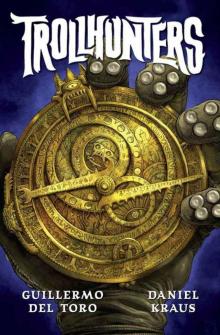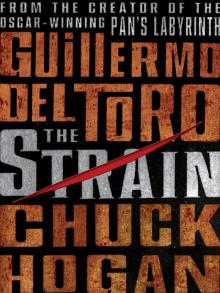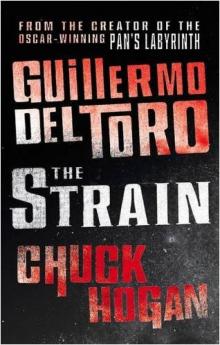- Home
- Guillermo Del Toro
The Shape of Water Page 4
The Shape of Water Read online
Page 4
“Submarines. You wouldn’t catch me on one of those death traps, I’ll tell you what.”
He’d looked at her then and smiled, and Richard, that poor, powerful man, hadn’t any idea the pain his smile conveyed. Lainie senses that he’s seen too much, in Korea, in the Amazon. There are things he’ll never share. This is a sort of mercy toward her, she tells herself, even as it makes her feel as if she’s all alone and floating away like a helium balloon.
No man who’s spent seventeen months in the South American jungle can reacclimate to civilian life just like that. Lainie knows this and tries to be patient. But it’s challenging. Those seventeen months changed her, too. Overnight, Richard had been stolen away by the ghastly General Hoyt and dropped into a world without telephones or mailboxes. Household decisions had to be made, all the time, and they’d hit her like a spray of buckshot. Where to take the car when it broke down. What to do with that skunk carcass in the backyard. How to stand up to plumbers, bankers, other men who thought a lady alone was ripe to be rooked. All while herding two kids bewildered and hurt by an abruptly vacated father.
And she’d been good at it. Yes, she’d spent the bulk of the first two months envisioning her new life from behind a gloss of tears: a widowed mother of two terrors who’d grow up shredding drapes and crayoning walls as she gulped down cooking sherry. Soon, though, her evening collapse had begun to feel like satisfied exhaustion. Gradually, tentatively, in private nooks of her mind, she began to shape a plan for when Richard was declared missing in action and the army ceased sending her checks. She scribbled figures on matchbooks, Timmy’s school reports, the back of her hand, calculating estimated wages versus concrete expenses. She knew she could handle a job. It even sounded exciting. It also made her feel like the world’s worst wife to find any spark of enthusiasm at all in the vanishing of her husband. But there would be a sort of peace without Richard, wouldn’t there? Hadn’t he always been a little hard? A little cold?
It’s fruitless to rehash. After all, Richard did come home, didn’t he? A full week now they’ve been back together, and doesn’t he deserve the same wife he left behind? Lainie works up a smile until she believes in it. If those submariners trusted Westinghouse’s nuclear whatsits, why, she should be proud to stand in her living room and use the Spray ’N Steam, the very first item she’d bought in Baltimore. Richard needs to look sharp for his new job, a place called Occam, and that makes ironing a priority. With so much wardrobe still boxed up, the children’s clothes need ironing, too. Timmy looks feral in his ragged playwear, and Tammy’s favorite velveteen jumper is dishrag thin. A housewife, she insists to herself, has plenty of interesting, important jobs to do.
3
TOUPEES ARE MADE from human hair. That Giles Gunderson’s hairpiece doesn’t altogether match the tussocks sprouting above his ears galls him. His real hair is brown, but get close enough and you’ll see strands of blond and orange. Not that anyone has gotten close in years. Had he known he’d be shiny-domed by age thirty, he would have begun stockpiling hair decades ago. Every young man should do so; they should teach it in health classes. He pictures bulging trash bags of hair crowding his childhood closets, lugging them from his parents’ house to his first apartment and beyond. He chuckles. No, sir, nothing strange about that.
Giles pockets one pair of his glasses, moves a second pair down from his forehead, tugs shut his suede coat, and steps from the cream-colored Bedford van that Mr. Arzounian, the Arcade’s owner, lets him park behind the theater, that of the rusted sliding door and water-stained upholstery, dubbed by Elisa as “the Pug” for its buggy headlights and flat snout. Baltimore hasn’t had a drop of moisture in months, but the wind is a cat-o’-nine-tails. Giles feels his toupee begin to lift from his scalp. He mashes his palms to his skull to restick the double-sided tape and rounds the Pug, head lowered against the wind.
It’s the posture of a bruiser, but he feels the opposite, feeble and overweening. He fights the van’s side door and removes his red-leather, brass-buckled portfolio case. Carrying it makes him feel important. He scrimped for a full year in his thirties to buy it, and it remains the single piece of professional gear he’d set right alongside anything owned by Manhattan hotshots. He heads up the sidewalk, the gale giving him a brisk shove. Negotiating a door with a portfolio case is a sophisticated procedure; by the time he’s through, everyone inside should be buzzing about the debonair gent with the giant leather bag.
Giles feels a familiar jab of doubt. His need to cushion his ego is pathetic, especially at a joint like this. Look around. Not a single soul has noticed his arrival. Giles stands taller in his own defense. Can these diners be blamed for their distraction? Dixie Doug’s Pies is a fun house of colored lights and reflective surfaces, from the pedestals atop which plastic pies revolve to the refrigerated display cases backlit with jukebox plastic and piped with chrome.
Giles mazes into the queue. It’s a weekday midafternoon, a peculiar time for pie, and he’s second in line. He likes being here, he tells himself. It’s cozy and warm and smells of cinnamon and sugar. He doesn’t look at the cashier, not yet; he’s too old to feel this nervous. Instead, he studies a five-foot glass tower, each level presenting a different dessert. Double-decker pies like department-store hat boxes. Sculpted pies like the bout of a cello. Pie puffs like a woman’s breast. There is room for all kinds, all kinds.
4
F-1 IS SIX times larger than Elisa’s apartment, modest for an Occam lab. The walls are white and resplendent above clean concrete floors. Silver ranks of tables wait against the walls while caster-wheel chairs in packing plastic huddle like homeless people around a trash-can fire. Braided cables dangle from the ceiling and hospital lamps on jointed arms ogle down at nothing. Along the eastern side is a bank of beige machinery, the type Elisa has heard called a “computer.” Janitors are forbidden to touch these imposing agglomerations of switches and dials, though they are expected to use compressed-air sprayers to blast away dust the final Friday of every month.
What is unique about F-1, and what beckons Elisa past the balking Zelda, is the pool. The crackling they’d heard was water expelling from an industrial hose into what resembles a giant stainless-steel sink built into the floor and enclosed by a knee-high ledge upon which three laborers have planted their boots. They are blue-collar Baltimoreans plainly uncomfortable with the job’s confidentiality; they watch their foreman hold out a pen and clipboard to a man of receding brown hair and spectacles—an Occam scientist, for sure, but one she’s never seen. He’s late-forties but squats on the ledge like a hyperactive boy, ignoring the foreman so as to compare his notes to three gauges extending from the pool.
“Too hot!” he cries. “Much too hot! Do you want to boil it?”
The man has an accent. Elisa doesn’t recognize it, and this wakes her up: She recognizes none of these people. Six workers, five scientists; she’s never seen so many people at Occam this late. Zelda pulls on Elisa’s elbow, and Elisa lets herself be backpedaled before a voice both of them know in their marrow speaks up.
“Attention, everyone, please! The asset is off the loading dock. Repeat: The asset is off the loading dock and is on the approach. Respectfully, I need the construction crew to stop where you are and exit the lab via the door to your right—”
David Fleming’s white shirt and neutral slacks had camouflaged him against the computer. Elisa sees him now, his arm forked in a gesture toward the very door in front of which she and Zelda stand like scolded children. Every head in the room turns their way. All these men, staring at them, these infringing females. Elisa’s cheeks burn, and she feels every ugly inch of her trash-spattered Occam grays.
“I apologize, everyone, our lady visitors are not supposed to be here.” Fleming lowers his voice to that of a chiding husband. “Zelda. Elisa. How many times do you have to be told? When there are men working inside—”
Zelda shrinks like one accustomed to absorbing blows, and Elisa sidesteps in front of her, an insti
nctive shielding that puts her, to her shock, directly in the path of a man hurrying straight at her. Elisa snatches a breath, squares her shoulders. Corporal punishment was habitual during her youth, and though that was fifteen years ago, hands have been laid upon her before at Occam. Fleming manhandling her from an unsteady office chair from atop which she cleared cobwebs; a biologist slapping her hand from a paper cup that contained not old coffee but some kind of sample; a security guard giving her a hard spank on her way to the elevator.
“Don’t leave.” He is the man with the accent. The hem of his white lab coat is soaked gray from the pool and his half-laced wingtips make dog-tongue splashes. His dripping hand is held palm-up in appeal, and he turns to Fleming. “These girls are cleared, yes?”
“They’re janitorial. They’re cleared, yes, for janitorial services.”
“If they are cleared, should they not hear?”
“With all due respect, doctor. You’re new. Occam has protocols.”
“But will they not clean this laboratory from time to time?”
“Yes, but only at my direct request.”
Fleming’s eyes snap from the scientist to Elisa, and she witnesses his recognition that he’d prematurely added F-1 to the QCC. Elisa jerks her head down at her cart, all those safe, crusty bottles and jugs, but it’s too late to retract the stinger: Fleming’s dignity is stung, and extra work for her and Zelda will be the punishment. The accented scientist sees none of this; he’s still smiling, convinced of his benevolence. Like most of the well-intentioned privileged Elisa has met, he has no grasp of the priorities of the servile, how all they want is to get through a shift without trouble.
“Very good,” the scientist says. “Everyone should understand the importance of the asset so that there are no mistakes.”
Fleming mashes his lips and waits for the construction crew to exit. Elisa and Zelda shrink from the burly men’s appraising looks. The scientist, blind to Elisa’s discomfort, holds out his hand to shake. Elisa gapes in horror at the man’s neatly clipped nails, clean palm, and starched shirt cuff. What will Fleming make of this etiquette breach? Worse than to take the hand is to ignore it, so she offers hers as listlessly as possible. The man’s palm is damp, but his grip is genuine.
“Dr. Bob Hoffstetler.” He smiles. “How do you work in those shoes?”
Elisa shuffles backward several inches so that her cart separates her shoes from Fleming’s line of sight. Fleming can’t be allowed to notice her shoes for the second time. She couldn’t bear it if he robbed her of that revolt. Hoffstetler misses nothing; he observes her small retreat and angles his head curiously. He appears to be waiting on a reply, so Elisa pushes a smile onto her blushing face and taps her name tag. Hoffstetler’s eyebrows settle in sympathetic understanding.
“The most intelligent of creatures,” he offers softly, “often make the fewest sounds.”
He smiles again and steps to the right to make similar introductions to Zelda, and though Elisa is mortified by the attention and curls her shoulders inward to make herself smaller, she notes with a somber sting that, in all her years at Occam, Dr. Hoffstetler’s smile is the warmest she’s ever received.
5
IT’S A FINE iron, no doubt about it. Forget fiddly demineralizer kits; it takes tap water straight, and it’s so agreeable to have all the settings on one dial. And it comes with a wall mount; that’ll be handy once her ironing board has a permanent place. For now, she’s set up in the living room in front of the TV. This is how her army-wife friends in Orlando did their housework. Lainie had always resisted. Once during Richard’s Amazon mission, she’d tried listening to Young Doctor Malone and Perry Mason on the radio while ironing and the distraction had been too potent. She got through a whole laundry basket without memory of having done so, and it bothered her. That’s how unchallenging your daily tasks are, Lainie. That’s how repetitive.
But last night in bed, insomnia had hatched an obvious but invigorating thought. The channel dial: She can change it. She doesn’t have to watch I Love Lucy, Guiding Light, and Password like the other wives; she can watch Today, NBC News, and ABC Early Afternoon Report. It’s a fresh idea, and it inspires her. So far, everything about Baltimore inspires her.
Getting dressed this morning—why, it’d felt like she’d been dressing for a cocktail party of intellectuals! She’d set her beehive before unfolding the ironing board, and by the tight ache at her temples, she knows it’s holding. What unravels, however, is her attention, ten minutes into the first newscast. Khrushchev is visiting the Berlin Wall. Just the word Khrushchev makes her blush; she mispronounced it three years ago at a function packed with Washington bigwigs, and Richard’s jaw had throbbed in embarrassment. And the Berlin Wall. Why does she know the name of every single character on Captain Kangaroo but not a thing about the Berlin Wall?
Lainie toggles the iron’s selector, unable to decide which setting will best eradicate wrinkles. Is it possible Westinghouse has given her, and every other woman in America, too many choices? She examines the face of the iron, counts seventeen vents, one for every month Richard spent in the Amazon. She blasts the steam, dips her face into the draft, and imagines that it’s the jungle’s heat.
This must be how the world felt to Richard when he’d called her from Brazil. It had been like hearing a ghost. One second, she’d been cutting crusts off peanut-butter sandwiches and reaching for the ringing phone. The next, she’d dropped the knife and let loose a shriek. She’d wept, insisting to him that it was a miracle. She’d had to force the tears, though, hadn’t she? Well, who could blame her? She’d been in shock. Richard had replied that he’d missed her, too, but his deadness of voice persisted; he sounded slow and mealy, as if he’d forgotten English. There was a crunching sound, too, like he was chewing something. Why would he be eating while talking to his wife for the first time in seventeen months?
It was easy to excuse. Maybe he’d been starving out in that jungle. He’d told her that they’d be moving to Baltimore, and before she could ask questions, he gave her his flight number to Orlando and gotten off the phone, still crunching. Lainie sat down, gazed at the home that, for a year and a half, had seemed so comforting and functional. Now it looked like a bachelor’s disaster. Nothing shone from spray or scrub. The iron that had died eight months ago she hadn’t even replaced. Oh, how she’d cleaned for the next two days, her scrubbing fists bursting through dishwashing gloves, her mopping hands weeping with blisters, her grouting knuckles trailing blood. A phone call from Washington rescued her, if not her marriage: Richard was being rerouted by sea to Baltimore. He’d meet her there in two weeks at a house of government choosing.
Lainie replays, almost hourly, the sight of Richard first walking through the door of the Baltimore house. The crisp, buttoned dress shirt he wore bagged about him like a druidic cloak. He’d lost weight and was pure, knotty muscle. His posture was wary and vulpine. He was shaven to a rubbery gleam, his cheeks milky white from being hidden by a jungle beard while the rest of his face had cooked bronze. For a long moment, they’d stared at each other. He squinted as if he didn’t recognize her; her fingertips flew to her beehive, her lipstick, her fingernails. Was it too much? Too dazzling after he’d seen nothing but raw, filthy men for so long?
Then Richard had gently lowered his bag to the ground and a single quake had rolled through his shoulders. Two small tears, one from each eye, rolled down his smooth cheeks. Lainie had never seen her husband cry, had even suspected he didn’t have the capacity, and to her surprise, it frightened her. She knew, though, that it was proof that she meant something, that they meant something, and she ran to him, bound her arms about him, pressed her own crying eyes into the stiff folds of his shirt. Several seconds later, she felt his hands on her back, but cautiously, as if his instinct had become to hurl off creatures that attached themselves to him.
“I’m … sorry,” he’d said.
Lainie still wonders about this. Sorry for being gone? Sorry for crying? Sorr
y for his inability to embrace her like a normal man?
“Don’t be sorry,” she said. “You’re here. You’re here. Everything’s going to be okay.”
“You look … you feel…”
She wonders about this, too. Did she look as strange to him now as South American fauna did seventeen months ago? Was her softness the softness of sucking mud, of boar carcasses, of other sorts of jungle rot she couldn’t begin to imagine? So she’d shushed him, told him not to speak, just to hold her. It’s something she regrets. Whatever lost well of emotion his two tears had indicated was crusted shut by the following day, impervious to her gentle prods. It was Richard’s protective instinct, perhaps, against the disorienting assaults of the city.
It was only when Timmy and Tammy rollicked down the stairs to greet their father did Lainie break from Richard, turn around, and consider the empty, unfurnished house behind her. Her knees wobbled with a terrible suspicion. What if she’d had nothing to do with Richard’s tears? What if it had been the perfectly clean, virtually silent rooms behind her that had moved him?
She wrangles the same dress shirt Richard had worn home around the ironing board’s nose. It’s best not to think such thoughts. It’s best to concentrate on what she can do now to be a better wife. Maybe it’s not Today-worthy, but Richard’s Occam job is important. Imagine what would happen if she left a burn mark on his shirt. It would hint at problems at home. And there aren’t any. Her job is to help Richard by taking the mess of warfare, however it hits him, and to scrub away the dirt, the grease, the oil, the gunpowder, the sweat, the lipstick if it comes to that, and to iron it tidy again, for her husband and family, of course, but also for her country.
6
THE NAME ON his tag reads BRAD, but Giles has seen him wear JOHN on occasion, and once even LORETTA. Giles presumes the second was by mistake and the third a joke, but the misnomers have introduced enough uncertainty that Giles is reticent to use any of them. He definitely looks like a Brad: six-foot-one, six-foot-two if he’d quit slouching, a face of forthright symmetry, straight teeth bordering on horsey, and a whipped-cream dollop of blond hair. His eyes, as melted-brown as the chocolate from the burned-down chocolate factory, brighten when they see him. Giles swears they do.

 Cabinet of Curiosities
Cabinet of Curiosities The Complete Strain Trilogy
The Complete Strain Trilogy Trollhunters
Trollhunters The Night Eternal
The Night Eternal The Fall
The Fall The Shape of Water
The Shape of Water The Strain
The Strain The Fall tst-2
The Fall tst-2 Guillermo del Toro's Cabinet of Curiosities
Guillermo del Toro's Cabinet of Curiosities The Strain tst-1
The Strain tst-1 The Strain, the Fall, the Night Eternal
The Strain, the Fall, the Night Eternal